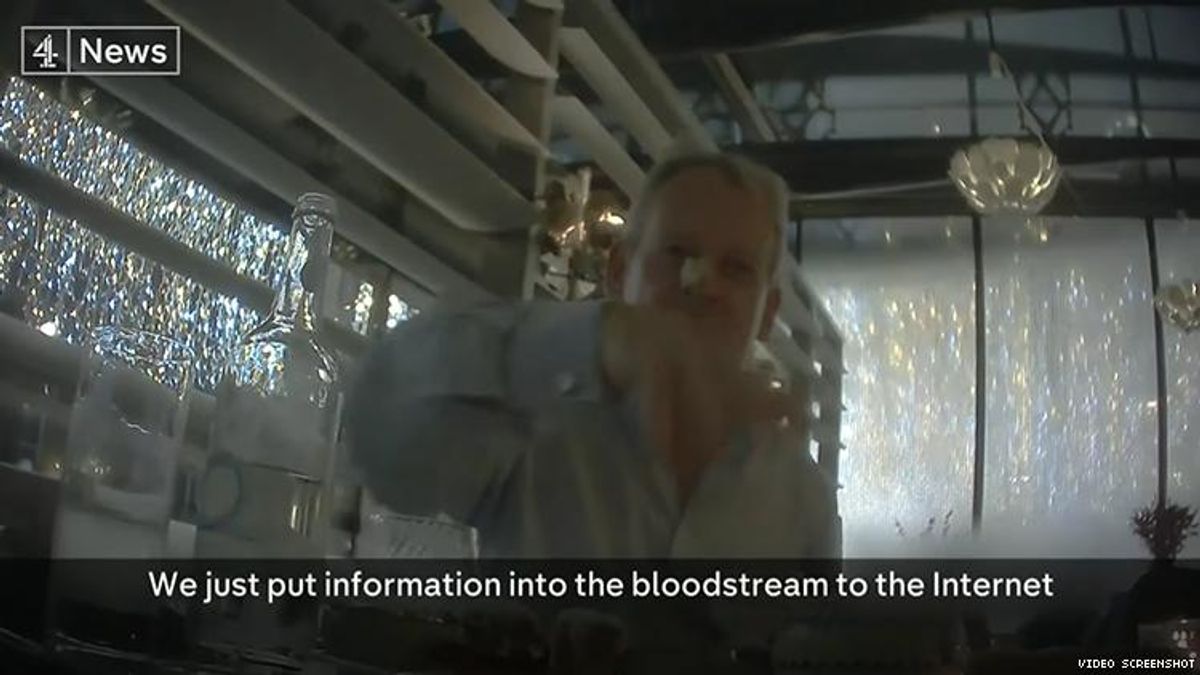The data analytics firm Cambridge Analytica -- bankrolled by wealthy Republicans and used by Donald Trump's presidential campaign -- was defending itself on multiple fronts this week, after reports questioned the ways it helped sway elections around the globe, including in the U.S. and U.K.
British officials launched investigations after the latest report, in which undercover footage from Channel 4 showed Cambridge Analytica CEO Alexander Nix telling potential clients (actually investigative journalists) that his company would lure political opponents into bribes and even encounters with prostitutes. When they had dirt on the opponents, the Cambridge executives said they would use third-party entities to spread their "kompromat" on the internet -- which included gay rumors, according to The Daily Beast -- so it couldn't be traced back to them.
A transcript of a conversation from January 2018 at the Berkeley Hotel was distributed by Channel 4. It includes discussion of spreading a gay rumor to help knock down a candidate. Nix says, according to the transcript, that "what we think are concerns as foreigners or as educate elites, or as professionals aren't concerns with the people that really matter." He cited an example from England when members of Parliament were caught expensing things that cost "just a few hundred or a few thousand pounds" but "really upset people." A controversy like that, says the reporter posing as the Sri Lankan fixer, "matters to the people." Then the reporter volunteered the notion that "if minister is homosexual" it could lead to a resignation. Nix countered, "These are things that, I mean, it sounds a dreadful thing to say, but these are things that don't necessarily need to be true, as long as they're believed."
The executives in these recorded conversations were clear about how rumors can impact an election outcome.
"We just put information into the bloodstream of the internet, and then, and then watch it grow, give it a little push every now and again," Mark Turnbull, another Cambridge executive, said on the Channel 4 tape. "Like a remote control. It has to happen without anyone thinking, 'that's propaganda', because the moment you think 'that's propaganda', the next question is, 'who's put that out?'"
In response to the report, Cambridge officials said their work, which they called opposition research, was legal and legitimate: "We entirely refute any allegation that Cambridge Analytica or any of its affiliates use entrapment, bribes, or so-called 'honey-traps' for any purpose whatsoever... We routinely undertake conversations with prospective clients to try to tease out any unethical or illegal intentions... Cambridge Analytica does not use untrue material for any purpose."
The revelation follows a report in The Guardian featuring the testimony of Christopher Wylie, a 28-year-old gay man who says he helped conceive of a plan to harvest Facebook data to gain political profiles on 50 million users. The Canadian-born Wylie worked for the British and Canadian governments before being hired by Republican billionaire donor Robert Mercer, who was starting a new data company that would eventually become Cambridge Analytica.
Wylie says he then met Breitbart's Steve Bannon -- who would become an adviser to Trump's presidential campaign and, later, his presidency -- in 2013. Together, Mercer, Mercer's daughter, Rebecca, Bannon, and Wylie would develop a partnership that included the Trump campaign paying nearly $6 million for Cambridge's data services, which culled from Facebook quizzes and "likes" and sent targeted advertising to users that played on their "hopes and fears." Many of the articles and posts painted Hillary Clinton in a negative light and Donald Trump in a positive one.
Wylie reported that Bannon and Rebecca Mercer saw gay people as influential and factored them into their strategy.
"[Rebecca Mercer] loved the gays," Wylie told The Guardian. "So did Steve [Bannon]. He saw us as early adopters. He figured, if you can get the gays on board, everyone else will follow. It's why he was so into the whole Milo [Yiannopoulos] thing."














































































Fans thirsting over Chris Colfer's sexy new muscles for Coachella